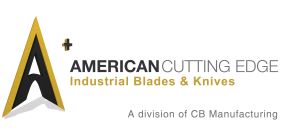Whether you're in plastics recycling, packaging, food processing or other industries that require industrial knives, it is easy to fall into an ordering rut. Instead of evaluating your cutting operation and looking for optimization opportunities, the daily work takes over, and organizations simply order the same knives over and over from the same supplier they have always used. Even as these knives begin to fail or display serious wear issues, provide poor cut quality, or require increased maintenance, businesses continue ordering the same replacement knives. This often occurs because knife users do not have the in-house expertise to evaluate their cutting application and develop improvement plans specifically related to the blades.
Knife manufacturers have the experience and knowledge to evaluate your cutting application and recognize optimization opportunities. Engineers with metallurgy and knife geometry experience analyze the material to be cut, the machine, current wear patterns of cutting knives, rotors, and dies, performance expectations, performance history, maintenance demands, and a host of other aspects to determine the best blade for your application.
When you work with an experienced knife manufacturer, and not just a distributor or reseller, you gain the benefit of an entire team of seasoned knife experts. But how do you know if you are working with a team of experts or simply a reseller?
Experts often possess more data than judgment. - General Colin Powell
A knife manufacturer needs to know about your unique operation before recommending a new blade. To understand your business, an expert knife manufacturer will ask:
Questions About Your Machine
- What machinery are you running?
- What is the make, model number, and knife configuration of your equipment?
- Is this a new piece of equipment or something you’ve had for some time?
- Who performs the maintenance on the machinery?
- Is the changing of the knives part of that maintenance?
Questions About Your Material
- What are you cutting?
- Is the material you’re cutting virgin, post-consumer, post-industrial, or post-landfill?
- What type of contamination is potentially found in your material?
- Are there any special considerations or challenges with the material you’re cutting?
Questions About Your Knives
- How often do you change your knives and why?
- Where are your knives currently coming from?
- Are you experiencing any knife-related anomalies?
- Has the life of your knives decreased recently?
- Has knife maintenance increased?
- Has there been a change in cut quality?
- Do you have your knives precision sharpened?
- When was the last time the knives were sharpened?
- How many sharpenings do your blades undergo before being replaced?
Questions About Failures and Performance Issues
- What is the typical mode of failure of your knife?
- How long did your knives last before the problem began and what is the expected life?
- What has changed since the problem began?
- Has there been a material change, operator/maintenance change, or change in knife supplier?
- Is the material to be processed coming from a new source?
- What kind of performance do you expect out of your knives?
Opportunities are problems in search of solutions. - Denis Waitley
And The Most Important Question: Can we have a sample knife?
At ACE, we ask clients to send a sample that exhibits the current mode of failure. That could be wear, chipping, or breakage. This approach to knife analysis allows us to understand where, when, and why failures are occurring. We look for things like evidence of heat stress, delamination, and dulling in addition to precision-measuring bevel geometry and performing material hardness tests.
You don’t build a business. You build people and then people build the business. -Zig Ziglar
Why Do We Ask So Many Questions?
The short answer is because we care. Over the last 50+ years, we have learned what to ask our clients and how each response shapes the next question and eventually leads to an ideal knife solution – one that saves time, money, and out-performs any previous solutions.
One of our clients, a large OEM chemical and polymer provider, suddenly began experiencing excessive knife wear in their dicing and pelletizing machine. With replacement knife sets running between $8,000 and $10,000, determining the cause of this change and finding a solution was paramount. The client’s current knives were manufactured of high-speed steel and coated to improve life; however, even with this hardened steel and coating, excessive wear was an issue.
ACE engineers invested more than a year analyzing machine performance, cut quality, and a variety of other factors to develop a customized solution – a CPM 10V coated knife that consistently delivers three-times the life. Needless to say, the client was delighted.
Developing a relationship with your custom knife supplier enables you to rely on their experts to continually optimize your industrial cutting operations. With American Cutting Edge experts on your team, you can ensure that your industrial blades or knives will be the best fit for your business.





